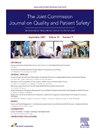Peer Support Programs for Physicians and Health Care Providers: A Scoping Review
IF 2.4
Q2 HEALTH CARE SCIENCES & SERVICES
Joint Commission journal on quality and patient safety
Pub Date : 2025-06-06
DOI:10.1016/j.jcjq.2025.05.003
引用次数: 0
Abstract
Background
Involvement in challenging clinical encounters can lead to significant emotional distress for physicians. Studies show that physicians prefer a supportive discussion with a peer physician over other forms of psychological support. This scoping review was conducted to identify the critical components of one-on-one peer support programs for physicians and other health care providers.
Methods
A literature search was conducted to systematically identify original studies describing the conception and implementation of and/or update to a one-on-one peer support intervention for health care providers including physicians. Studies meeting inclusion criteria were reviewed and charted to describe (1) critical components of a peer support encounter, (2) logistical considerations for program implementation, and (3) methods of evaluating a peer support program.
Results
A total of 1,028 citations were identified, and 25 were included in the final analysis. Most peer support programs were for health care providers including physicians (n = 18; 72.0%), with fewer targeting physicians only (n = 7; 28.0%). Principles of peer support identified included confidentiality, informality, and voluntary participation. Frameworks for empathetic listening were commonly included. Creation of a process for escalation to higher levels of care, such as counseling or emergent psychiatric care, was the most frequently described program component. Peer supporters were most often recruited based on peer nominations or appointment, rather than self-nomination. Training of peer supporters, identification of individuals in need of support, and program administration were approached in various ways, dependant on the setting and target population. Utilization metrics and feedback through open-ended or quantitative surveys were the most common mechanisms of program evaluation.
Conclusion
With the tools and strategies outlined in this scoping review, physicians and health care providers may be better equipped to lead change in their departments though the development of peer support initiatives.
医生和卫生保健提供者的同伴支持计划:范围审查。
背景:参与具有挑战性的临床遭遇会导致医生显著的情绪困扰。研究表明,比起其他形式的心理支持,医生更喜欢与同行医生进行支持性的讨论。本综述旨在确定医生和其他医疗保健提供者一对一同伴支持项目的关键组成部分。方法:进行文献检索,系统地识别描述卫生保健提供者(包括医生)一对一同伴支持干预的概念和实施和/或更新的原始研究。对符合纳入标准的研究进行了审查并绘制了图表,以描述(1)同伴支持遭遇的关键组成部分,(2)计划实施的后勤考虑,以及(3)评估同伴支持计划的方法。结果:共鉴定出1028条引文,其中25条被纳入最终分析。大多数同伴支持项目是针对包括医生在内的卫生保健提供者的(n = 18;72.0%),较少只针对医生(n = 7;28.0%)。确定的同伴支持原则包括保密、非正式和自愿参与。同理心倾听的框架通常包括在内。创建一个升级到更高级别护理的过程,如咨询或紧急精神病学护理,是最常被描述的项目组成部分。同行支持者通常是通过同行提名或任命而不是自我提名来招募的。同伴支持者的培训,需要支持的个人的识别,以及项目管理都以不同的方式进行,这取决于环境和目标人群。通过开放式或定量调查的利用度量和反馈是项目评估最常见的机制。结论:有了本综述中概述的工具和策略,医生和卫生保健提供者可以更好地通过同伴支持倡议的发展来领导他们部门的变革。
本文章由计算机程序翻译,如有差异,请以英文原文为准。
求助全文
约1分钟内获得全文
求助全文
来源期刊

Joint Commission journal on quality and patient safety
HEALTH CARE SCIENCES & SERVICES-
CiteScore
3.80
自引率
4.30%
发文量
116
审稿时长
49 days
 求助内容:
求助内容: 应助结果提醒方式:
应助结果提醒方式:


